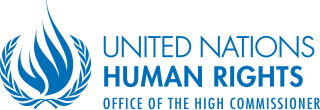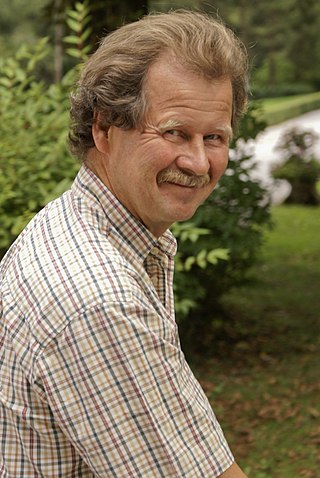
The Office of the United Nations High Commissioner for Human Rights (OHCHR) is a department of the United Nations Secretariat that works to promote and protect human rights that are guaranteed under international law and stipulated in the Universal Declaration of Human Rights of 1948. The office was established by the United Nations General Assembly on 20 December 1993 in the wake of the 1993 World Conference on Human Rights.

Hans Axel Valdemar Corell is a Swedish lawyer and diplomat. Between March 1994 and March 2004 he was Under-Secretary-General for Legal Affairs and the Legal Counsel of the United Nations. In this capacity, he was head of the Office of Legal Affairs in the United Nations Secretariat.

The United Nations Human Rights Council (UNHRC) is a United Nations body whose mission is to promote and protect human rights around the world. The Council has 47 members elected for staggered three-year terms on a regional group basis. The headquarters of the Council are at the United Nations Office at Geneva in Switzerland.

The Convention on the Elimination of all Forms of Discrimination Against Women (CEDAW) is an international treaty adopted in 1979 by the United Nations General Assembly. Described as an international bill of rights for women, it was instituted on 3 September 1981 and has been ratified by 189 states. Over fifty countries that have ratified the convention have done so subject to certain declarations, reservations, and objections, including 38 countries who rejected the enforcement article 29, which addresses means of settlement for disputes concerning the interpretation or application of the convention. Australia's declaration noted the limitations on central government power resulting from its federal constitutional system. The United States and Palau have signed, but not ratified the treaty. The Holy See, Iran, Somalia, Sudan, and Tonga are not signatories to CEDAW.

The Committee on the Rights of the Child (CRC) is a body of experts that monitor and report on the implementation of the United Nations Convention on the Rights of the Child.

Juan E. Méndez is an Argentine lawyer, former United Nations Special Rapporteur on Torture and Other Cruel, Inhuman or Degrading Treatment or Punishment, and a human rights activist known for his work on behalf of political prisoners.

Manfred Nowak is an Austrian human rights expert, who served as the United Nations Special Rapporteur on Torture from 2004 to 2010. He is Secretary General of the Global Campus of Human Rights in Venice, Italy, Professor of International Human Rights, and Scientific Director of the Vienna Master of Arts in Applied Human Rights at the University of Applied Arts in Vienna. He is also co-founder and former Director of the Ludwig Boltzmann Institute of Human Rights and a former judge at the Human Rights Chamber for Bosnia and Herzegovina. In 2016, he was appointed Independent Expert leading the United Nations Global Study on Children Deprived of Liberty.

Prince Zeid bin Ra'ad bin Zeid al-Hussein is a Jordanian former diplomat who is the Perry World House Professor of the Practice of Law and Human Rights at the University of Pennsylvania. He is also the president and CEO of the International Peace Institute. He also served as United Nations High Commissioner for Human Rights from 2014 to 2018. He played a central role in the establishment of the International Criminal Court, and was elected the first president of the Assembly of State Parties of the International Criminal Court in September 2002. He also served as a political affairs officer in UNPROFOR in the former Yugoslavia from 1994 to 1996.

Philip Geoffrey Alston is an Australian international law scholar and human rights practitioner. He is John Norton Pomeroy Professor of Law at New York University School of Law, and co-chair of the law school's Center for Human Rights and Global Justice. In human rights law, Alston has held a range of senior UN appointments for over two decades, including United Nations Special Rapporteur on extrajudicial, summary or arbitrary executions, a position he held from August 2004 to July 2010, and UN Special Rapporteur on extreme poverty and human rights from 2014-2020.

The Convention on the Rights of Persons with Disabilities is an international human rights treaty of the United Nations intended to protect the rights and dignity of persons with disabilities. Parties to the convention are required to promote, protect, and ensure the full enjoyment of human rights by persons with disabilities and ensure that persons with disabilities enjoy full equality under the law. The Convention serves as a major catalyst in the global disability rights movement enabling a shift from viewing persons with disabilities as objects of charity, medical treatment and social protection towards viewing them as full and equal members of society, with human rights. The convention was the first U.N. human rights treaty of the twenty-first century.

Discussions of LGBT rights at the United Nations have included resolutions and joint statements in the United Nations General Assembly and the United Nations Human Rights Council (UNHRC), attention to the expert-led human rights mechanisms, as well as by the UN Agencies.
Pablo de Greiff is a Colombian academic and human rights activist, who served as the first United Nations Special Rapporteur on the promotion of truth, justice, reparation and guarantees of non-recurrence. In January 2015 he was also asked to be part of UNIIB, a United Nations mission of Independent Experts to address the situation in Burundi. From 2019 to 2020 he was part of a group of experts advising the UN Human Rights Council on its preventive functions. In April 2022 he was appointed as one of the three commissioners in the Independent Commission of Inquiry on Ukraine established by the UN. Since 2014 he is a Senior Fellow at the Center for Human Rights and Global Justice of the School of Law at New York University, where he directs both the Transitional Justice Program and the Prevention Project.

The United Nations special rapporteur on the rights to freedom of peaceful assembly and of association works independently to inform and advise the United Nations Human Rights Council. The special rapporteur examines, monitors, advises and publicly reports on the rights to freedom of peaceful assembly and of association worldwide.

David Kaye is an American politician who served as the United Nations special rapporteur on the Promotion and Protection of the Right to Freedom of Opinion and Expression between August 2014 and July 2020. He was succeeded by Irene Khan. Kaye is clinical professor of law at the University of California, Irvine on public international law, international humanitarian law human rights and international criminal justice. He is co-director of the UCI Fair Elections and Free Speech Center working at the intersection of technology, freedom of speech and democratic deliberation. He is also the independent board chair of the Global Network Initiative.

Marcia Vaune Jocelyn Kran is a Canadian lawyer and expert member of the UN Human Rights Committee. Kran's career has spanned international human rights law, criminal law and political science for over forty years, and includes positions in academia and civil society. Kran has held a range of senior United Nations positions including in international human rights law.
Mihir Kanade is an author and professor of international law, human rights and development at the University for Peace (UPEACE), a university founded by the United Nations. He holds the concurrent positions of the Academic Coordinator of UPEACE since 2016, the Head of its Department of International Law since 2014, and the Director of the UPEACE Human Rights Centre since 2009.
The Independent International Commission of Inquiry in Ukraine is a United Nations commission of inquiry established by the United Nations Human Rights Council on 4 March 2022 with a mandate to investigate violations of human rights and of international humanitarian law in the 2022 Russian invasion of Ukraine. The Commission delivered its reports on 18 October 2022 and 16 March 2023.
The International Commission of Human Rights Experts on Ethiopia (ICHREE) was established by the UN Human Rights Council in December 2021. The mandate of the commission is to investigate allegations of violations and abuses of international human rights law, humanitarian law and refugee law in Ethiopia committed since 3 November 2020 by all parties to the conflict. The Commission comprises three human rights experts and is appointed for a renewable one-year term. In October 2022 at the Human Rights Council's 51st session, the Commission's mandate was extended to December 2023.
Siobhán Mullally is an United Kingdom-born Irish Professor of Law and the UN special rapporteur on human trafficking.
Cecilia M. Bailliet is a Norwegian professor of law who became the United Nations Independent Expert on human rights and international solidarity in 2023.













